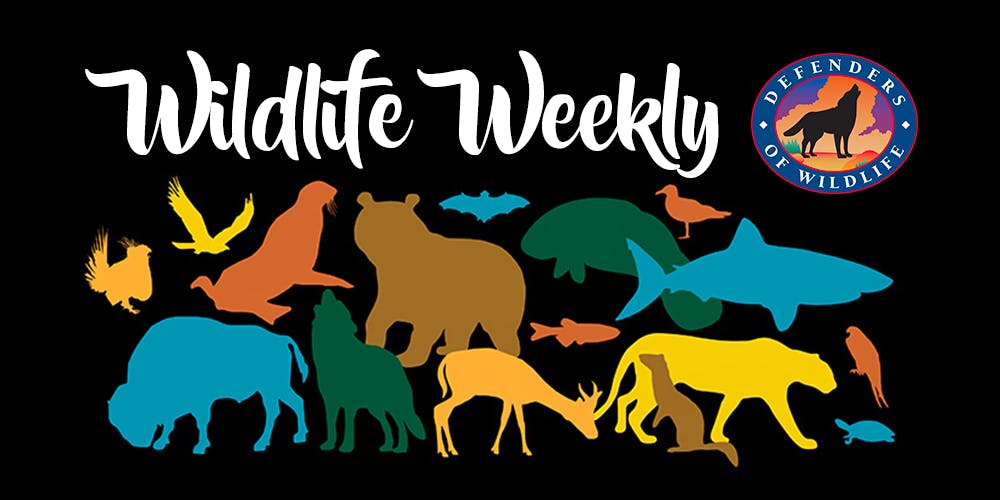Your weekly roundup of wildlife news from across the country
WildSights:
[slideshow_deploy id=’33833′]
Wild stories from the Week:
For multiple species like the pronghorn, being able to go where the food is and where mates are is a critical part of their survival. That’s why a border wall that would slice connected habitat in half could have a severe impact on a range of animals: http://dfnd.us/2rO01Js
Thanks to recovery efforts, there is good news for California’s southern sea otters: http://dfnd.us/2sSjPQc
We got an exclusive, behind-the-scenes look at the work they do at the Ivanpah Desert Tortoise Research Facility: http://dfnd.us/2sQBtV5
Grizzly bears are off the Endangered Species list. We will hold state agencies accountable for protecting them:
Our Defenders in Action:
In California:
 Defenders recently participated in a June 15th rally sponsored by Mojave Desert Land Trust in support of Mojave Trails National Monument-California’s newest and largest national monument. Designated under the authorities of the Antiquities Act in recognition of the historic Mojave Trail and more recent Highway 66, this national monument encompasses vital wildlife corridors, singing sand dunes, sparkling desert oases, mountain ranges traversed by desert bighorn sheep and critical habitat for California’s state reptile, the threatened desert tortoise. This incredible contribution to protecting our American Legacy is being reviewed by the U.S. Department of Interior for possible rescission or reduction; to which Defenders attending this rally voiced their strenuous opposition. Defender’s Monumental California maps depicting the state’s five national monuments currently under review were distributed to this passionate crowd of monument supporters at the Idle Spurs Restaurant in Barstow, who, in addition to getting their kicks on Highway 66, are letting their voice be heard.
Defenders recently participated in a June 15th rally sponsored by Mojave Desert Land Trust in support of Mojave Trails National Monument-California’s newest and largest national monument. Designated under the authorities of the Antiquities Act in recognition of the historic Mojave Trail and more recent Highway 66, this national monument encompasses vital wildlife corridors, singing sand dunes, sparkling desert oases, mountain ranges traversed by desert bighorn sheep and critical habitat for California’s state reptile, the threatened desert tortoise. This incredible contribution to protecting our American Legacy is being reviewed by the U.S. Department of Interior for possible rescission or reduction; to which Defenders attending this rally voiced their strenuous opposition. Defender’s Monumental California maps depicting the state’s five national monuments currently under review were distributed to this passionate crowd of monument supporters at the Idle Spurs Restaurant in Barstow, who, in addition to getting their kicks on Highway 66, are letting their voice be heard.
In Colorado:
 Aaron Hall, our Rockies & Plains Program Representative, was at the Leadville antabuse online Fish Hatchery helping to spawn native cutthroat trout. The greenback cutthroat trout, Colorado’s state fish, is a threatened species under the Endangered Species Act. Colorado Parks and Wildlife has taken fish from the single population in the wild for spawning and eventual release into their historic habitat. During this trip, Aaron helped to spawn some of the hatchery cutthroats born in 2013 and 2014, to maximize the diversity in the population and create more fish to release in the future. He also helped to prepare another lineage of cutthroat trout, native to the Colorado River watershed, for spawning by removing the eggs from the females so that they can produce new eggs for next year.
Aaron Hall, our Rockies & Plains Program Representative, was at the Leadville antabuse online Fish Hatchery helping to spawn native cutthroat trout. The greenback cutthroat trout, Colorado’s state fish, is a threatened species under the Endangered Species Act. Colorado Parks and Wildlife has taken fish from the single population in the wild for spawning and eventual release into their historic habitat. During this trip, Aaron helped to spawn some of the hatchery cutthroats born in 2013 and 2014, to maximize the diversity in the population and create more fish to release in the future. He also helped to prepare another lineage of cutthroat trout, native to the Colorado River watershed, for spawning by removing the eggs from the females so that they can produce new eggs for next year.
In Wyoming:
 Defenders’ staff Chamois Andersen and Jonathan Proctor recently visited Thunder Basin National Grassland in northeast Wyoming to meet with ranchers and agency staff in an attempt to find common ground on prairie dog management. Thunder Basin National Grassland is one of the best remaining intact prairie dog ecosystems in North America’s Great Plains. Large prairie dog colonies have become far too rare and isolated across the Great Plains, and this has contributed to significant losses of wildlife that depend on these large colonies such as black-footed ferrets, mountain plovers, ferruginous hawks, swift fox, burrowing owls and more. We promoted our ideas for nonlethal management and made plans to cooperate on habitat restoration projects this fall. Our hope is to reduce human conflicts with prairie dogs and in that way create a brighter, more secure future for wildlife in this important area.
Defenders’ staff Chamois Andersen and Jonathan Proctor recently visited Thunder Basin National Grassland in northeast Wyoming to meet with ranchers and agency staff in an attempt to find common ground on prairie dog management. Thunder Basin National Grassland is one of the best remaining intact prairie dog ecosystems in North America’s Great Plains. Large prairie dog colonies have become far too rare and isolated across the Great Plains, and this has contributed to significant losses of wildlife that depend on these large colonies such as black-footed ferrets, mountain plovers, ferruginous hawks, swift fox, burrowing owls and more. We promoted our ideas for nonlethal management and made plans to cooperate on habitat restoration projects this fall. Our hope is to reduce human conflicts with prairie dogs and in that way create a brighter, more secure future for wildlife in this important area.



